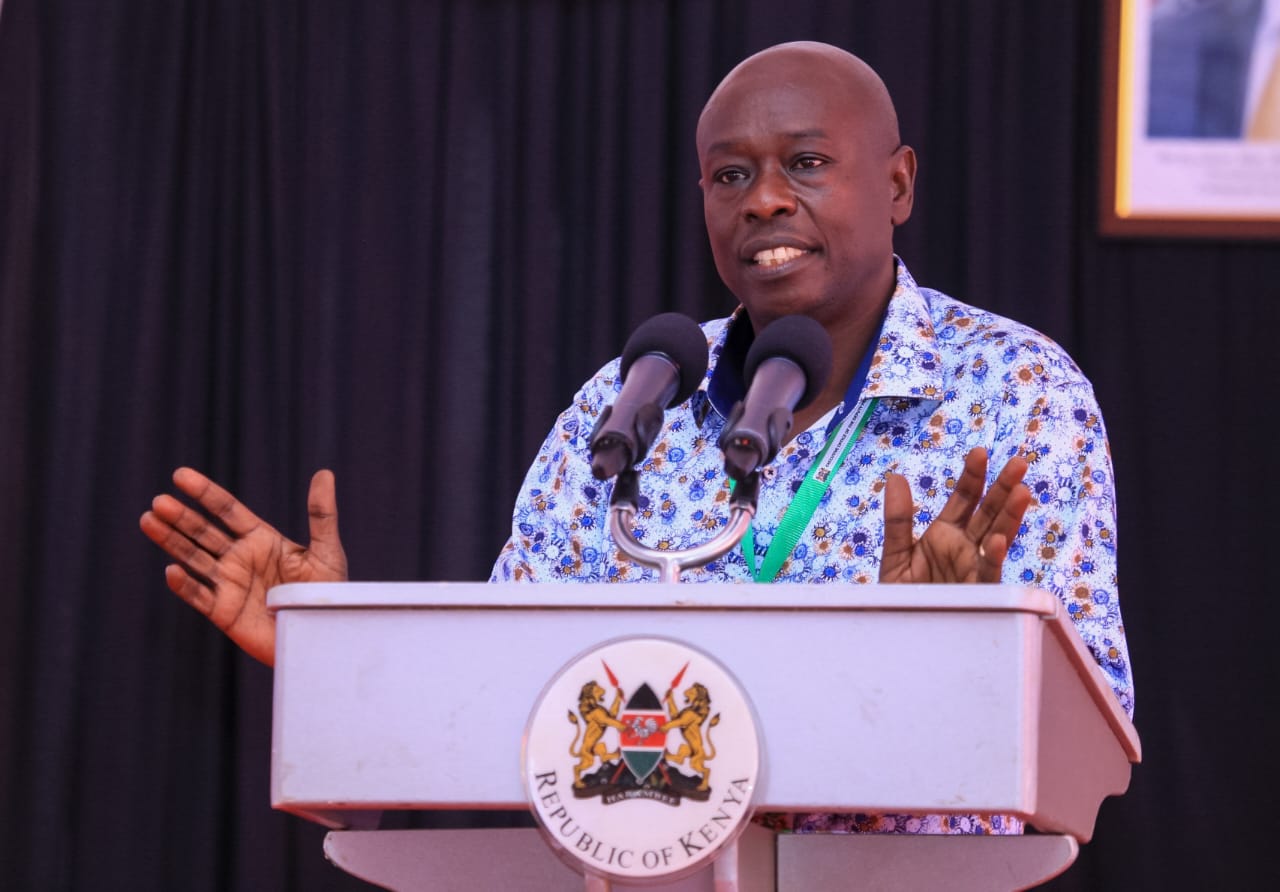She claimed that the cartels bribe senior government officials as well as factory management to continue their corrupt practices.
According to the statement from Governor Cecily Mbarire, she claimed the existence of three coffee cartels in Kenya: 1. Neumann; 2. Ecom; 3. Sucafina. Here are the details on how these cartels work using associated milling companies, marketing companies, and affiliate buyers as claimed by the governor. Why this information? These cartels are allegedly stealing from Kenyan coffee farmers.
The governor claimed that the firm is milling as NKG Coffee Mills Kenya Ltd, address: Sukari Industrial Estate, Eastern By Pass, Ruiru, Kenya. Marketing through Tropical Farm Management, Oakland Coffee Management. Buying from farmers as Ibero Kenya Ltd ( “Coffee Wholesaler”)
When allocating duties to the Deputy President early this year, President William Ruto moved the coffee reforms docket to the DP’s office. It was previously under the Executive Office of the President.
“The President has instructed me to lead reforms in the tea, coffee, and milk subsectors. This is aimed at putting more money in the pockets of farmers by linking them directly to consumers. The cartels are ruthless, but we will stop at nothing,” said the DP following the announcement.
Coffee was at some point a leading foreign exchange earner, accounting for 40 per cent of forex earnings, but production has dropped over the years.
The crop raked in Sh27 billion in 2022, a notable increase from Sh10 billion in 2020, but a negligible contribution to Kenya’s total exports of Sh873 billion last year.
Coffee production stood at 52,000 tonnes in 2022, according to data by the Kenya National Bureau of Statistics (KNBS).
Although this is a huge increase from 34,500 tonnes in 2021, it is still a fraction of how much the country produced in the late 1980s when production averaged 130,000 tonnes annually. The decline has been due to a mix of factors, including poor governance in the industry that resulted in poor earnings among farmers, some of whom have, in turn, abandoned the crop.
The previous Jubilee administration had made attempts to reform the coffee sector in a bid to take back to its glory days, which achieved mixed results and may be partly credited to the recent increase in production and earnings.
Former President Uhuru Kenyatta in March 2021 issued an executive order on coffee sector reforms, which envisioned reforms across different areas, including access to credit for farmers and the tabling of the Coffee Bill in Parliament.
Among the new approaches to revive the industry is the reintroduction of the Coffee Board of Kenya.
The Coffee Board of Kenya was among the industry-specific regulators that were collapsed into the Agricultural Food Authority (AFA).
The Authority has, however, failed to live up to its expectations and is set to be disbanded as the sub-sector regulators, including the coffee, tea and sugar boards make a comeback.
Coffee is grown in 31 counties. Smallholders are the majority at 700,000 and are organised into cooperatives, according to government data, while there are 4,000 estate farmers in the country.
The sub-sector supports approximately five million people through forward and backward linkages. The former administration had in 2016 constituted the National Task Force on Coffee Sub-Sector Reforms that was to look into the problems facing the sector and come up with recommendations to save the sector that has for decades stared at total collapse.
The 19-member committee led by Prof Joseph Kieyah made recommendations that have only been implemented piecemeal and half-heartedly.
The task force in its May 2016 report noted that the sector faced “unprecedented challenges, which have drastically affected the production levels.”
“Key among them are low earnings from coffee despite its premium quality, delayed coffee payments, mismanagement and inefficiencies in cooperatives, restrictive coffee laws, high cost of production and lack of direct access to the trading floor,” said the task force.
The team also recommended prompt payment to farmers for coffee delivered to coffee mills, the opening up of the Nairobi Coffee Exchange for farmers to directly trade at the auction and putting in place a coffee production subsidy.
It at the same time called for reforming coffee cooperatives to strengthen them but also enable farmers to hold them to account and proposed such measures as capping administrative expenses at 15 per cent and punitive measures for entities that fail to comply with the law.
DP Rigathi
Deputy President Rigathi Gachagua now claims that his brother, former Nyeri Governor Nderitu Gachagua, was killed by powerful coffee cartels.
In a live televised interview on Inooro, Gachagua claimed his elder brother was poisoned a move that led to the deterioration of his health and death.
The former governor died on February 24, 2017 as a result of pancreatic cancer.
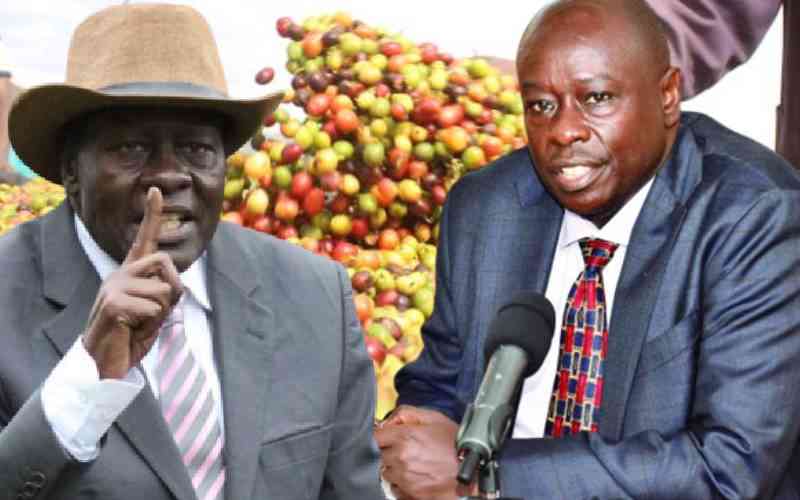
Former Nyeri Governor the late Nderitu Gachagua and Deputy President Rigathi Gachagua.
Nderitu Gachagua who had served as Mathira Constituency MP before becoming a governor died aged 64 while receiving treatment at a London hospital.
But in a new twist of events, the deputy president claimed deep pocketed coffee cartels had a hand in the death of his late brother.
“Our family believes and we know that our brother was poisoned by the cartels, he was very healthy but when he declared war on cartels, his health deteriorated,” he told Inooro TV.
Gachagua painted a picture of highly connected and convoluted coffee cartels who have controlled State officials to deny coffee farmers their hard earned money.
“When my brother declared war on cartels, they joined hands and went abroad and blocked the Kenyan coffee a move that later incited locals against him. We are ready for that and have instituted certain measures that I won’t disclose,” he said.
With that in mind, Gachagua said he was assigned to deal with the cartels since he and President William Ruto have no interests in the sector and because he is ‘incorruptible’.
“These guys are ruthless. Cabinet Secretaries and other government agencies can’t deal with the cartels due to their powerful and evil schemes,” he said.
He added, “When we appointed Mithika Linturi for the Agriculture docket, they tried to bribe him with Sh30 million to get to their trap but Linturi informed me and the Head of State, this is how I was given the responsibility.”
The DP further disclosed that he had directed police boss to increase security details of Embu Governor Cecily Mbarire after her daring move to name some of the cartels.
“She named the cartels that have impoverished we have increased her security even at her homes, this war can only be won by the President and I since we have enough security and can’t be corrupted,” he said.
Before the interview, Gachagua had informed Meru vernacular stations that he too had been approached by cartels with Sh7 billion proposal but he declined.
“I’m done having children, they are educated and in formal jobs while my wife is a pastor with no huge expenses, even if they bribe the electorate and deny me votes in 2027 as long as farmers will have money in pockets, I will be satisfied and go home peacefully,” he said.
Gachagua said Kenya Kwanza’s regime remains steadfast and will triumph to win the war even though it will not be a walk in the park.
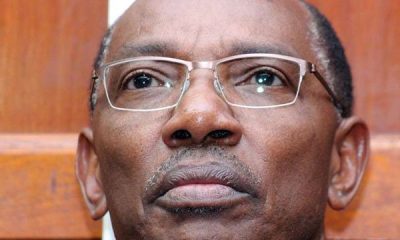
 Investigations1 week ago
Investigations1 week ago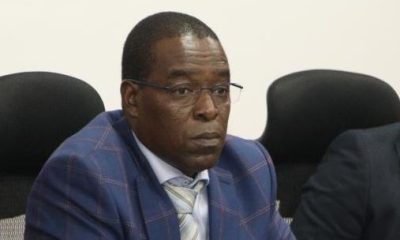
 Investigations1 week ago
Investigations1 week ago
 Investigations1 week ago
Investigations1 week ago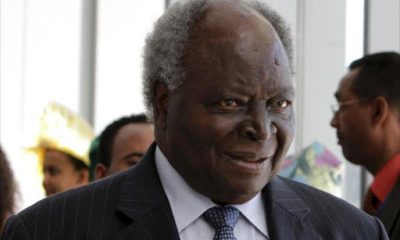
 Investigations1 week ago
Investigations1 week ago
 Opinion2 weeks ago
Opinion2 weeks ago
 News2 weeks ago
News2 weeks ago
 Investigations1 week ago
Investigations1 week ago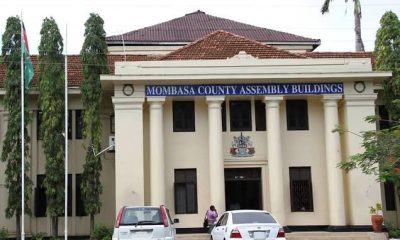
 Investigations1 week ago
Investigations1 week ago
